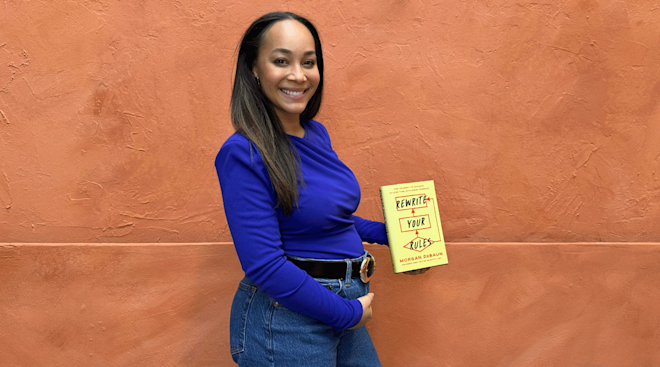When to Announce Pregnancy to Friends, Family and Colleagues
Congratulations, you’re expecting! With so much on your mind already, from nursery decor to baby names, deciding when to tell people you are pregnant can feel like a big decision. While there’s no one-size-fits-all answer to when to announce pregnancy, we’ve gathered insights from ob-gyns, experienced moms and legal experts to help guide you on this exciting journey.
When to tell people you are pregnant is a highly personal decision. Your “when” depends not only on your current situation but your past experiences, your needs, wants and gut feelings. While there may be various things to consider—from your partner’s opinion to medical advice and workplace accommodations—whether you decide to shout your pregnancy from the rooftops the moment you see a positive pregnancy test or wait to share the big news until you’re heading to the hospital to welcome your little one, there’s truly no right or wrong answer.
It’s important to remember that your journey is unique. What works for “most people” might not be right for you (and, FYI, this is a lesson you’ll learn time and time again throughout your pregnancy and parenting journey). But if you’re looking for a little more guidance on when to tell people you’re pregnant, there are a few milestones that moms-to-be and expecting people often wait for when announcing a pregnancy. Use these not as hard and fast rules but rather as points to consider when establishing your own timeline for telling people you are pregnant.
After you confirm a heartbeat
Once they get a positive pregnancy test, many parents are eager to hear baby’s heartbeat. While cardiac activity on an ultrasound can often be visible as early as six weeks, you might not visit your provider for your prenatal appointment until around week 7 or 8. “Many parents choose to wait until after their first ultrasound that confirms the viability and dating of the pregnancy,” says Rhonia Brooks-Gordon, MD, an ob-gyn practicing in New York City. At this prenatal visit, your provider will determine a due date, discuss screenings for certain genetic disorders and even check for twins or triplets—all things that can be important when it comes to considering when to announce pregnancy.
Beyond the first trimester
Many expectant moms choose to wait till after the first trimester to share the news that they’re pregnant. According to the American College of Obstetricians and Gynecologists (ACOG), 80 percent of miscarriages happen during the first trimester, making this a sensitive period. For healthy women in the US, the miscarriage risk is anywhere from 10 to 25 percent, and this risk increases as you get older, around 20 to 35 percent once you hit 35 and up to 50 percent at age 45. The good news: After the first trimester, the risk of miscarriage drops to only about 1 to 5 percent. And according to a study, after an ultrasound confirms baby’s heartbeat at eight weeks, the risk of miscarriage drops to about 3 percent.
“I waited to tell friends and family until after the second trimester to ensure there wasn’t a high chance of miscarriage,” shares Stephanie H, a parent we polled via social media. Despite wanting to share as soon as she found out, at 6 weeks, Natalie R., a mom and Facebook community member, says that she and her partner waited until after the first trimester since the experience can be “an emotional rollercoaster.” When it came time for Brooks-Gordon to welcome her own children, she also waited till the second trimester: “As an obstetrician, I have had the privilege of taking care of hundreds of patients. From my experience, I have seen how critical the first trimester can be. It was really important for me to get through the first trimester before sharing the good news with our extended family and friends.”
After genetic testing
Waiting until after genetic testing brings many parents-to-be an added level of knowledge and reassurance. ACOG notes that parents can screen for Down syndrome, other chromosomal abnormalities or possible defects of the heart, skeleton and/or abdominal wall at around 10 to 13 weeks. Other screenings or diagnostic tests, such as amniocentesis occur later. So, really, the timing depends on your risk level and which screenings and tests you decide to move forward with.
After your 20-week ultrasound
Many parents choose to share the big news around the 20-week mark. During your second-trimester ultrasound, you should be able to confirm a clear due date and learn baby’s sex, if you haven’t already. Plus, you’ll typically get a better sonogram picture of baby printed out if you wish to use one during your announcement.
Whatever milestones you choose to wait for, know that there’s no wrong answer and you reserve the right to change your style and approach from pregnancy to pregnancy. “With my first pregnancy in 2020, I announced quickly right after my first trimester. I was so excited to share it with everyone and get advice and recommendations because I had no idea what I was doing,” says Lauren Finney Harden, an Atlanta-based content marketer and expectant mother of two. “With my second, the timing became a little trickier. Not only was I pregnant, but I was a mom to a toddler and my energy was depleted. After a very hard first trimester, I kept it secret or only to those who needed to know until I hit 20 weeks.”
Need help deciding if you want to announce your pregnancy earlier or later? It can be helpful to work through the benefits and drawbacks.
One of the biggest positives of announcing your pregnancy early on is that you’re more apt to get help and support during difficult times. The earlier you tell your family, friends and coworkers about your pregnancy, the more likely they are to understand and provide support related to your exhaustion, morning sickness or other pregnancy symptoms. Not only will friends, family members and coworkers be there to help you through first-trimester symptoms and struggles, they can also provide emotional support in the event of a complication or loss.
With all of these pros, come some cons too. By announcing your pregnancy earlier, you’re putting yourself in a more vulnerable place, exposed to the questions, suggestions and possible criticism of others. In the event of a complication or loss, it could become difficult to answer questions.
While you may have your reasons for not telling your family, friends or coworkers, you should feel empowered to talk with your partner about your pregnancy as soon as you find out. Together, you can discuss what things you want to take under consideration.
After sharing the news of your pregnancy with your partner, the next step often involves informing your immediate family. For those who anticipate needing support or assistance from their immediate family, such as help with childcare, emotional support or advice, sharing the news earlier can be beneficial. It not only allows family members to be involved from the beginning but can also foster a sense of closeness and excitement.
On the other hand, some expectant parents may opt to delay sharing the news with their immediate family for various reasons. Past experiences with complications or concerns about potential loss may lead to a desire for privacy. Additionally, strained relationships or a lack of emotional closeness with family members could contribute to the decision to wait. By delaying the announcement, you can feel more emotionally prepared to navigate potential reactions and discussions with family members.
Sharing your pregnancy news with friends early on can allow them to offer support and celebrate with you throughout your journey. Early disclosure can also create opportunities for friends to be involved in planning and preparation for the new arrival.
Alternatively, some parents-to-be may choose to wait until they feel more comfortable or until they’ve reached certain milestones in the pregnancy before sharing the news with friends. Waiting to share the news can also allow for a more selective and intimate sharing experience, focusing on close friendships and relationships.
Much like telling your friends and family about your pregnancy, telling your workplace about your pregnancy can feel exciting and intimidating all at once. Licensed family, labor, and employment attorney Evie P. Jeang says that there’s no legal requirement as to when you have to tell your employer.
Jeang stresses that it’s crucial to acquaint yourself with your company’s policies, including those under the Family Medical Leave Act (FMLA). FMLA allows eligible employees to take up to 12 weeks of unpaid, job-protected leave for specified family and medical reasons. Outside of FMLA, it’s often beneficial to consider the nature of your job responsibilities, the presence of any pregnancy-related symptoms or upcoming career opportunities when deciding when to tell people you’re pregnant. If adjustments to your workload or responsibilities may be necessary, an early announcement may facilitate smoother transitions.
Reflecting on her own announcement, Jeang says she’s come to appreciate the vital importance of proactive communication. “Despite being self-employed and without a direct reporting structure, I realized the significance of keeping my team informed,” she recalls. “Prioritizing my law firm ensured seamless operations for when the baby arrived.”
On the other hand, if you’re vying for a promotion or searching for a job, delaying your announcement might be beneficial. While the Pregnancy Discrimination Act of 1978 prohibits discrimination on the basis of pregnancy, childbirth or related medical conditions, several parents believe latent discrimination is still prevalent.
Finney Harden decided to keep her pregnancy under wraps until 20 weeks partially because she was looking for a new position and didn’t want to jeopardize her chances. “Pregnancy discrimination is real!” she says. “Plus, I was still very unwell and didn’t feel sunny or glowy. I also think that I needed less advice and support the second time around.”
So when should you tell people you are pregnant at work? Brooks-Gordon says around the mid-second trimester is a good time to share the good news with your employer. “At this point, you may have had most of your screening tests and major ultrasounds performed. Your provider may have identified any major concerns that need to be addressed or closely followed,” she adds. She also calls out the second trimester as a good time to chat with your human resources team about ways they can help support you throughout your pregnancy. Be sure to ask about available benefits like short-term disability, paid nesting time and maternity leave.
After sharing the big news with family, close friends and your workplace, you may want to announce your pregnancy on social media. Whether you opt for a grand reveal or a casual post, the choice is yours. If you aren’t feeling like sharing right now (or ever), there’s no need.
“We have never been the kind of family that does gender reveals or fancy staged pregnancy announcements, and, somehow, this time at 20 weeks, it just felt right to do it so casually and later than the previous pregnancy,” Finney Harden, who shared a short video of her bump on social media. “I am really into the idea of ‘hard launching’ a baby or pregnancy…So few things are kept secret these days, and it feels special to live in a little bubble for a while.”
Once you’ve decided on the timing, the fun part begins—announcing your pregnancy! With a plethora of options from gifts to videos and ultrasound photos, you may choose to reveal your pregnancy in different ways when talking to different people, from your parents to your friends and coworkers. Looking for some options? Check out these unique pregnancy announcements worthy of your big news.
As you navigate this exciting time, remember that there’s no definitive right or wrong approach to sharing your news. Trust your instincts, cherish each moment and enjoy the anticipation of welcoming your little one.
Plus, more from The Bump:
Evie P. Jeang, is a mom, licensed attorney in California and New York and the founder of the Ideal Legal Group. Ideal Legal Group specializes in providing representation and guidance across various legal domains, including family law, international surrogacy, labor and employment issues, immigration and workers’ compensation.
Rhonia Brooks-Gordon, MD, ob-gyn, is a mother of two boys and currently practices in New York City. She went to undergraduate at Spelman College, received her medical degree from The Ohio State University College of Medicine and completed her residency training at Northwell Health.
American College of Obstetricians and Gynecologists, Early Pregnancy Loss, August 2018
American Pregnancy Association, Warning Signs of Miscarriage
American College of Obstetricians and Gynecologists, Prenatal Genetic Screening Tests, November 2023
Department of Labor, Family Medical Leave Act (FMLA)
Learn how we ensure the accuracy of our content through our editorial and medical review process.
Navigate forward to interact with the calendar and select a date. Press the question mark key to get the keyboard shortcuts for changing dates.





















































